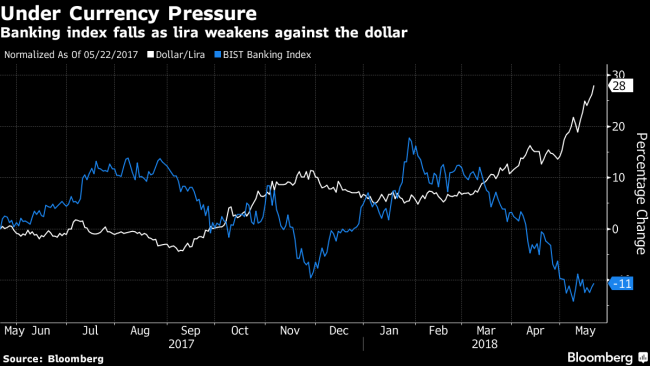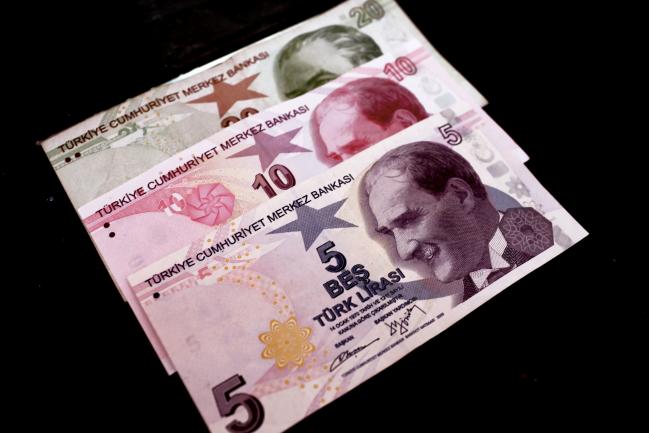(Bloomberg) -- Turkey’s banks are at risk of losing their reputation as the crown jewel of the economy as the government’s single-minded focus on growth threatens to undermine profits and cause an uptick in bad loans.
Lenders in one of the world’s fastest-expanding emerging markets are finding themselves at the center of President Recep Tayyip Erdogan’s ambitions of winning another election in an early vote called for June 24. As the state ramps up spending to sustain last year’s 7.4 percent increase in gross domestic product, pressure is piling up on banks to keep extending loans at interest rates that barely compensate them for inflation, narrowing profit margins.
A loss of faith in Erdogan’s economic policies -- mostly aimed at retaining the popular vote -- has also caused the lira to plunge to a record low against the dollar. That’s squeezing borrowers, many of whom are heavily indebted in foreign currency. Rate increases by the central bank have also been criticized by some analysts as not being enough to contain inflation near a record high.
“Turkey is now running the risk of damaging the banking sector,” said Inan Demir, an economist at Nomura International Plc. The weakening lira is hitting the balance sheets of companies, which “will eventually lead to an erosion in banks’ asset quality,” he said, adding that the central bank’s inaction is only deepening the problem. Any “foreign-currency shock may make depositors and foreign lenders even more risk averse.”
The weakness in the lira may have also contributed to the timing of the country’s biggest takeover deal since 2012. On Tuesday, Dubai’s Emirates NBD agreed to buy Sberbank PJSC’s Turkish unit for 14.6 billion lira ($3.2 billion).
‘First Cracks’
The corporate sector has to repay a record $337 billion in foreign-currency debt, while banks have already had to restructure 78 billion liras ($17 billion) in loans because of turmoil in local and international politics that’s battered the local currency. Lenders are already stretched following a government-backed credit program that contributed to their loan-to-deposit ratios soaring to 128 percent, impairing their ability to keep extending credit while making the companies themselves heavily dependent on foreign borrowing.
“Asset quality is already showing the first cracks as we see a rise in restructured loans, which is likely to increase as lira’s weakness persists,” said Tomasz Noetzel, a Bloomberg Intelligence analyst covering eastern European lenders. “Defending margins will become more complicated. A potential GDP slowdown will only exacerbate the pain of generating revenue.”
So far, the banks are holding up, with non-performing loans holding below 3 percent of total credit despite the convulsions experienced in the economy and political spheres. The nation’s lenders also have more than enough buffers to protect themselves against any storms, boasting a capital adequacy ratio of 17 percent, well above 12 percent required by the regulator.
The banking industry is strong enough to navigate through the risks and the economy has remained resilient against shocks, the Turkish Banking Association said on May 16. Repayments on loans that have been restructured -- which comprise only 3.8 percent of total credit -- are at 80 percent, it said.
The operating environment for banks has become more challenging, which could cause the NPL ratio to deteriorate to 4 percent by the end of this year as more companies face financial difficulties and the construction sector weakens, Moody’s Investors Service said in a note on May 15. Moody’s expected economic growth to slow 4 percent in 2018 and 3.5 percent next year.
Investors are already prepared for more hardship for Turkey’s lenders, with the 13-member Borsa Istanbul Banks Index losing 9.4 percent over the past 12 months compared with an 8.3 percent gain in the Borsa Istanbul 100 Index.
A win that will help Erdogan extend his 15-year rule of the country will increase the risk of lower bank profits if he follows through on his pledge to take more responsibility for monetary policy. The 64-year-old president has for years criticized the central bank for using interest rates to tame inflation, while also urging banks to lower their charges.
As many as seven banks responded to calls by Prime Minister Binali Yildirim on May 7 to reduce their rates on home loans, which account for about 10 percent of total credit in the system. Lenders led by state-run Ziraat Bankasi AS cut mortgage rates to below 1 percent a month, which compares with consumer inflation of 1.87 percent in the month of April.
“I doubt that the move will trigger a purchasing spree in big-ticket spending while markets are so volatile,” said Nomura’s Demir. Turkish home sales fell 9.9 percent in April from a year ago, the third straight month of declines. "If it does, it will erode banks’ profits.”
(Adds acquisition of Sberbank’s Turkey unit in fifth paragraph.)

